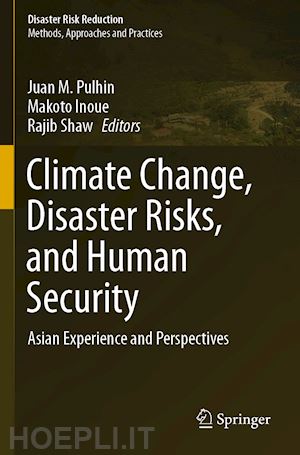
Questo prodotto usufruisce delle SPEDIZIONI GRATIS
selezionando l'opzione Corriere Veloce in fase di ordine.
Pagabile anche con Carta della cultura giovani e del merito, 18App Bonus Cultura e Carta del Docente
This book explores how climate change and disaster risks threaten human security in Asia. Climate change and disaster risks have emerged as major human security challenges in the twenty-first century, and are an imminent “threat multiplier” with the potential to harm the vital core of human life and curtail people’s freedom and ability to live with dignity. Climate change and disaster risks undermine the security of individuals, communities, nations, and the world, considering the increasing trend in the frequency and magnitude of hydro-meteorological disasters and the projections on their future adverse impacts.
Despite recent advances in the literature, there is still a major gap in understanding the relationship and linkages between climate change, disaster risks, and human security, particularly as gleaned from the Asian experience. Asia is the world’s most vulnerable region in terms of the quantity and magnitude of impacts from various forms of disaster. At the same time,it has developed a number of innovative responses to address those risks, offering a wealth of experience. Exploring and capitalizing on the Asian perspective, this book provides valuable resource material for students, academics, researchers, policymakers, and development practitioners working in these areas.Dr. Juan M. Pulhin is a full professor and former dean of the College of Forestry and Natural Resources, University of the Philippines Los Baños, Philippines. He was a lead author of the 2007 Fourth Assessment Report of the Intergovernmental Panel on Climate Change (IPCC), a coordinating lead author of the Human Security Chapter of the 2014 IPCC Fifth Assessment Report and currently a lead author of the Asia chapter of IPCC Sixth Assessment Report. He has been a four-time visiting professor at the University of Tokyo in 2007, 2010, 2016 and 2017 and a Visiting Scholar at the Waseda University, Tokyo in 2018. He has written and edited 11 books and published more than 100 technical papers and book chapters on natural resources policy and governance, and on the human dimension of climate change and disaster risks. He is a fellow, invited expert, and council member of several international organizations and a member of the Philippine National Academy of Science and Technology (NAST).
Dr. Makoto Inoue is a professor at the Faculty of Human Sciences, Waseda University, Japan and former professor at The University of Tokyo. He serves as a dean of Graduate School of Human Sciences, Waseda University effective September 2020. His specialty is environmental sociology, forest governance, and Southeast Asian studies. He has written and edited/co-edited 34 books, and published more than 140 original articles in peer-reviewed international and national journals on the social aspects of forestry and the environment. He serves as President of The Japanese Association for Environmental Sociology (June 2019-present), Vice President of Japanese Society for Current Anthropology (January 2020-present), Vice President of Society for Environmental Economics and Policy Studies (April 2018-March 2020), Councilor of The International Association for the Study of the Commons (January 2019-present ), a board member of various academic societies in Japan, and an editorial board member of several international journals.
Dr. Rajib Shaw is Professor at the Keio University in Japan and former Executive Director of the Integrated Research on Disaster Risk (IRDR) programme. He is also the Senior Fellow of Institute of Global Environmental Strategies (IGES) Japan, and the Chairperson of SEEDS Asia, and CWS Japan, two Japanese NGOs. Previously, he was a professor at the Graduate School of Global Environmental Studies, Kyoto University, Japan. His expertise includes community-based disaster risk management, climate change adaptation, urban risk management, and disaster and environmental education. He is the editor of a book series on disaster risk reduction, published by Springer, Editor-in-Chief of the journal Progress in Disaster Science. He severs as the Chair of United Nations Science Technology Advisory Group for disaster risk reduction, and is the co-chair of the UNDRR’s Asia-Pacific Science Technology Academic Advisory Group (ASTAAG). Prof. Shaw has published more than 45 books and more than 300 academic papers and book chapters.











Il sito utilizza cookie ed altri strumenti di tracciamento che raccolgono informazioni dal dispositivo dell’utente. Oltre ai cookie tecnici ed analitici aggregati, strettamente necessari per il funzionamento di questo sito web, previo consenso dell’utente possono essere installati cookie di profilazione e marketing e cookie dei social media. Cliccando su “Accetto tutti i cookie” saranno attivate tutte le categorie di cookie. Per accettare solo deterninate categorie di cookie, cliccare invece su “Impostazioni cookie”. Chiudendo il banner o continuando a navigare saranno installati solo cookie tecnici. Per maggiori dettagli, consultare la Cookie Policy.